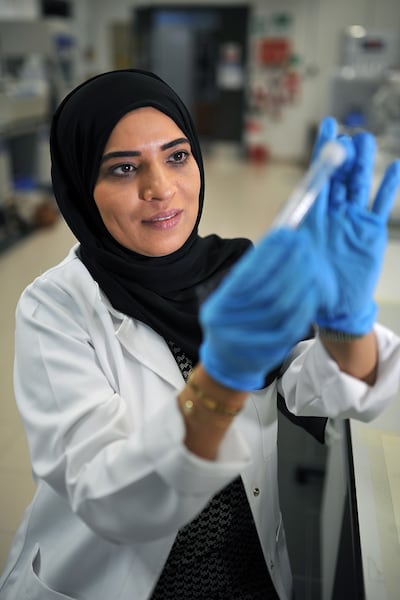Scientists in the UAE have found that some bacteria in the gut may reduce the severity of Covid-19 in infected people.
The study carried out by scientists at the University of Sharjah, Khalifa University of Science and Technology in Abu Dhabi, and other institutions, said the make-up of the gut microbiome may influence the severity of the disease and the body's immune response.
The work is among the latest of many studies of the relationship between the gut microbiome and Covid-19, some of which have analysed how diet influences a person’s ability to fend off the coronavirus.
King's College London
The study, published in Frontiers in Microbiology, looked at 86 infected people and another 57 without the disease.
It found that in the infected group, there was a greater abundance of some types of disease-causing bacteria in the gut, and higher levels of some that cause inflammation. These, the researchers suggested, may have played a role in the early symptoms of those who were infected.
“Since patients’ gut microbiota were only sampled after they were infected with the virus, we are unsure whether pre-existing gut dysbiosis contributing to more severe Covid-19 symptoms, or whether Covid-19 was the cause of the gut dysbiosis. This is very similar to the chicken and egg question,” said the study’s senior author, Dr Habiba Alsafar, director of the Centre for Biotechnology and associate professor of molecular biology and genetics at Khalifa University in Abu Dhabi.
But in this group, who had been infected with Covid-19, there was also a greater abundance of certain types of anti-inflammatory bacteria and of several types of bacteria that produce butyrate, a fatty acid that can strengthen the immune response.
These are types of symbiotic bacteria, meaning they have a mutually beneficial relationship with the person in whom they are found.
“Altogether, perhaps the gut symbiotic response plays a significant role in counteracting Covid-19 dysregulated immune response, restoring homeostasis [a stable situation], and subsequently reducing Covid-19 pathogenesis and disease manifestations,” the researchers said.
While Covid-19 is primarily a respiratory illness, the gut has an immunological function and the microorganisms it contains are important in responding to infection.
The researchers noted that ACE2 receptors, which are abundant on cells in the human respiratory system and are the attachment points for the coronavirus, are also expressed in some cells that line the intestine. As a result, these intestinal cells could be additional sites of infection for SARS-CoV-2, the virus that causes Covid-19.

“The most important connection between gut microbiome and Covid-19 is the involvement of the ACE2 receptor,” said Dr Alsafar.
“The ACE2 receptors regulate the gut microbiota, and when a viral infection, like SARS-CoV-2, can enter these receptors, it causes a dysregulation of the intestinal system.”
Dr Alsafar said specially formulated probiotics might improve the gut microbiome, although a consultation with a doctor would be required for best results.
“Healthier diet, including a fruit and vegetable-rich diet, with more exercise, will impact gut microbe communities,” she said.
A separate study published early this year in the journal Gut produced some results consistent with the UAE study.
For example, it found that lower levels of a butyrate-producing bacterium, Faecalibacterium, which was also discussed in the UAE study, were associated with more severe infections.
This study’s authors, all of whom work at institutions in Hong Kong, also concluded that the gut microbiome may affect a person’s immune response to infection with the coronavirus and influence how severe the disease is and the eventual outcome.
They also suggested that ongoing imbalances in the microbiome after infection may cause the persistent symptoms seen in people with long Covid.
The UAE and Hong Kong studies add to the knowledge generated by a major research by King’s College London and Harvard Medical School that involved hundreds of thousands of people contributing data through an app.
It found that people with the healthiest diets were 10 per cent less likely to develop Covid-19 and 40 per cent less likely to become seriously ill from it.
Prof Tim Spector, of genetic epidemiology at King’s College London, said people with diets with low levels of ultra-processed foods had healthier gut microbes that were more likely to fend off infection.
“You don’t have to go vegan, but getting more diverse plants on your plate is a great way to boost the health of your gut microbiome, improve your immunity and overall health, and potentially reduce your risk from Covid-19,” he said at the time of the report's release in September.











